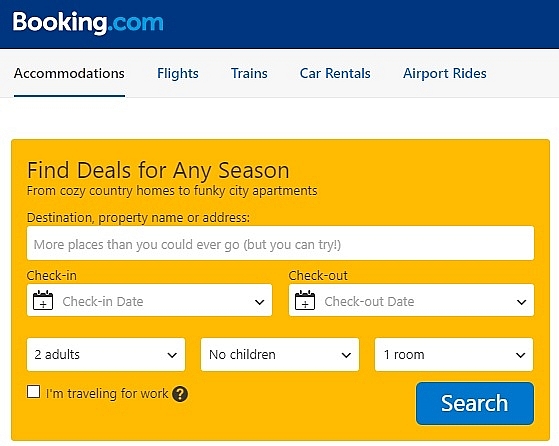Agoda and Booking.com in crosshairs of customers and authorities
 |
| Agoda and Booking.com are getting on the wrong side of customers and authorities alike (Source: booking.com) |
Disclosing customers’ credit card information
Recently, a customer named Hien Vu complained about Agoda’s oversight in protecting the personal information of its customers. Notably, he booked a hotel room via Agoda.com, however, his personal information was transferred to Booking.com which is also under the management of Priceline Group.
It is even more dangerous that all of his credit card information were transferred to the hotel’s receptionist without being encrypted. Agoda’s mistake action creates an opportunity for unauthorised people to access customers’ crucial information.
In another case, a customer named N.M. released that last year he booked a room via Booking.com, however, only a few days later, his account lost VND7 million without explanation. As a result, he had to close his Visa account.
Along with customers, leaders of hotels also complained about the working attitude of these international online booking hotel sites. The director of a hotel located in Danang complained heavily to VIR about both Agoda and Booking.com.
Previously, after receiving booking money from customers and taking off 20 per cent commission, they would transfer the remainder to the hotels’ account, however, at present, the hotels themselves take the money off customers’ accounts, which is a time-consuming process. Besides, hotels have to take responsibility for keeping the information confidential.
After Hien Vu accused Booking.com of disclosing his credit card information, Booking.com admitted that it sent all the credit card information of customers to hotels so that hotels can have the necessary data to manage customers’ booking. Booking.com’s admission raised concerns about booking hotels online in general and Booking.com in particular.
Suspicions of tax evasion
According to lawyers, directly transferring the credit card information of customers to hotels is legal. Booking.com and Agoda have professional law consultancy teams, which have ways to lay traps for customers. Accordingly, they include an article allowing the agency to transfer customers' credit information to hotels inthe contracts' privacy clause where customers rarely look. However, experts considered the practice a form of tax evasion.
At present, international online booking hotel sites like Agoda, Traveloka, Booking.com, and Expedia are dominating the online hotel booking market in Vietnam with massive annual revenue, however, almost none of them pay taxes.
Previously, in late January 2017, the Ministry of Finance (MoF) asked booking sites that allow tourists to book hotel rooms in Vietnam to calculate and pay VAT and CIT. Targeted websites include Agoda, Traveloka, Booking, and Expedia. Specifically, the CIT rate is 5 per cent of the total revenue. VAT is calculated based on the added value that the companies, called “the foreign contractor” by the ministry, make.
However, MoF also admitted that it will have to continue making studies to issue regulations to control these firms’ operations.
These firms’ massive commission revenue without being subject to tax pressure domestic tourism firms heavily. According to Le Dac Lam, general director of Vntrip.vn, numerous foreign enterprises found ways to evade taxes, including Agoda.
Notably, when Vietnamese customers pay Agoda to book rooms in hotels and resorts in Vietnam, Agoda takes 20 per cent of every booking on its website without being subject to tax. Agoda said that this revenue is considered as earnings outside of the territory of Vietnam and that the company does not have an obligation to pay taxes for Vietnam.
Lam estimated that revenue from bookings in all hotels and resorts in Vietnam could reach $21 billion by 2020, 50 per cent of which would come from online bookings and the foreign online booking sites may enjoy an estimated benefit of $1.25 billion from playing the role of intermediaries between customers and hotels and resorts.
Thereby, Vietnam loses thousands of billions of dongs due to foreign online booking sites’ refusal to pay taxes.
Along with Vietnam, the tax authorities in France also accused Booking.com of evading the payment of $400 million in tax.
What the stars mean:
★ Poor ★ ★ Promising ★★★ Good ★★★★ Very good ★★★★★ Exceptional
Related Contents
Latest News
More News
- Manila becomes a new check-in destination for Vietnamese youth (December 11, 2025 | 18:07)
- Vietjet launches mega year-end ticket promotion (December 10, 2025 | 11:33)
- Dalat leads Vietnam’s 2025 search trends (December 09, 2025 | 13:44)
- Vietnam welcomes record wave of international visitors (December 09, 2025 | 13:43)
- Vietjet launches daily Manila flights to celebrate year-end festive peak season (December 05, 2025 | 13:47)
- The destinations powering Vietnam’s festive season travel demand (December 04, 2025 | 18:33)
- Vietnam named among the world’s most exciting winter destinations (December 04, 2025 | 15:10)
- Phu Tho emerges as northern Vietnam’s new tourism hub (December 01, 2025 | 17:00)
- Vietjet completes Airbus A320/A321 updates ahead of deadline (December 01, 2025 | 09:49)
- Vietjet resumes Con Dao flights from early December (November 28, 2025 | 15:24)

 Tag:
Tag:





















 Mobile Version
Mobile Version